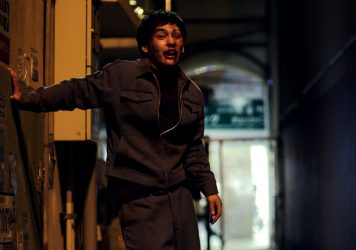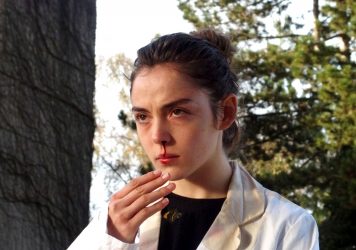This madcap meta-horror from Japan’s Shin’ichirô Ueda breathes new life into the zombie genre.
Few horror films generated as much online chatter in 2018 as Shin’ichirô Ueda’s long-take zombie movie, One Cut of the Dead. Most recently, on the eve of its UK release, an illegal copy of the film was uploaded to Amazon’s Prime streaming service, putting the indie flick’s international box-office hopes in jeopardy.
Until then, however, the film had been a slowly simmering success, from its unheralded initial release in 2017 to its eventual blockbuster status in its native Japan the following year, where it made back 1000 times its shoestring budget, beating the likes of Ready Player One and Venom in the end of year tallies (lagging slightly behind that cultural juggernaut, The Boss Baby).
Throughout the past 12 months, word spread: this is an audience-pleasing, surprising and very welcome treat for film fanatics. A zombie film with a twist, best experienced fresh, unspoiled and with a crowd. (Consider that a gentle warning: there be spoilers ahead.)
An ultra low-budget zombie film is shooting in a remote warehouse location. The director (Takayuki Hamatsu – flowery shirt, ratty demeanour, intense dedication to the authenticity of drama) turns to diabolical methods when 42 takes of a key scene yield unsatisfying results. Soon, real zombies start to flood the set, leaving the film’s two young stars and an unexpectedly tough make-up artist to fight for their lives as, periodically, the director pops up, grinning at the peril, camera in hand, bellowing ‘actioooon!’.
Shot in one long take and replete with zombie-horror cliches, One Cut of the Dead lurches and lumbers until, 36 minutes in, our Final Girl emerges, drenched in blood but alive to act another day. And then the credits roll…
What begins as a charming if ramshackle take on well-worn genre convention mutates in a moment. The action shifts to one month earlier, and we are introduced to Takayuki Higurashi (Hamatsu again), a deadbeat director of karaoke music videos whose professional motto is ‘fast, cheap, but average’. A new project comes his way, the opportunity to launch a zombie-themed TV channel with a live, single-take special called… One Cut of the Dead.
As the movie-within-the-movie plays out once more from a behind-the-scenes perspective, what first seemed tropey and ropey takes on new meaning as a chaotic backstage farce unfurls. Parts are recast moments before broadcast; scenes are rewritten on the fly; actors turn rogue.
However, in stark contrast to the smart-aleck irony of post-Scream Hollywood horror, One Cut of the Dead is remarkably free from cynicism, playing out instead as a big-hearted celebration of bodge-job, seat-of-your-pants, adrenaline-rush filmmaking. In the face of endless production hurdles, cast and crew come together to deliver the best they can, culminating in a tremendously satisfying, resoundingly wholesome climax as the final shot fades to black.
It’s this sincerity that makes One Cut of the Dead the perfect film for horror fans, and it’s no surprise that its reputation was built on the festival circuit. After all, is there a community more obsessed with how their cinematic sausage is made? The horror appetite is made up of communal movie marathons, tidbit-filled audio commentaries, and piles of Fangoria or Famous Monsters of Filmland magazines reaching up to the heavens.
One Cut of the Dead celebrates the scrappy spirit that birthed a billion B-movies, and the make-do mavericks that keep a genre churning in defiance of the ebb and flow of popular opinion. ‘Elevated horror’ this is not: Ueda’s zany meta-horror reveals how the shared experience of filmmaking can elevate us all.
Published 4 Jan 2019
Strong word of mouth from the festival crowd, and an unlikely smash hit in Japan.
A magnificent matroshka doll of movie-making metatextuality.
A genuinely clever and loving tribute to cinema at its most homemade.

By Anton Bitel
Destruction Babies is raucous rebel filmmaking at its brutal best.

By Mark Asch
A kaleidoscopic and intentionally lurid gangster rap battle movie from Japanese provocateur Sion Sono.

By Grace Lee
Grace Lee searches for meaning amid the so-called monstrosity of this superlative 2017 horror.